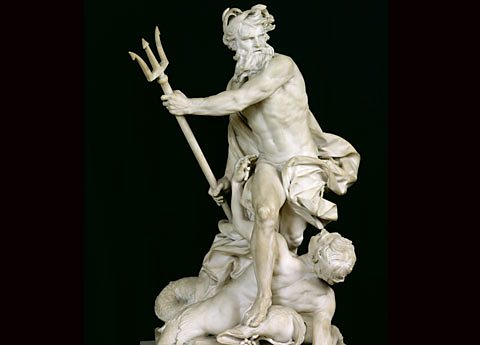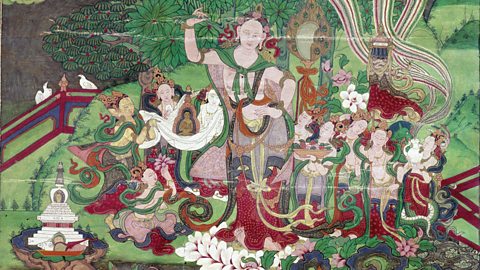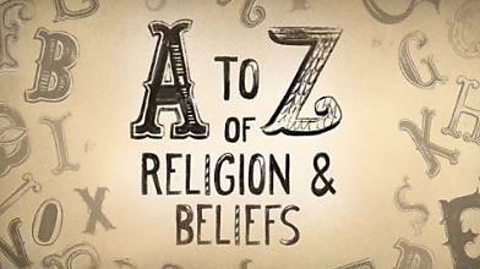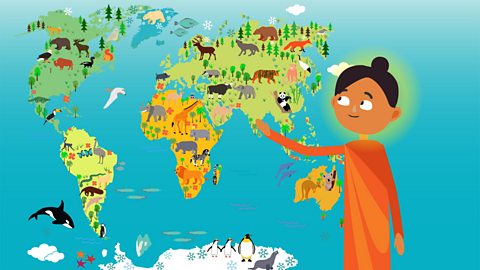1. It's everywhere
Religion – the belief in supernatural beings, including gods and ghosts, angels and demons, souls and spirits – can be found throughout history and in every culture. Evidence for beliefs in an afterlife goes back at least 50,000 to 100,000 years. Every known human culture has creation myths, with the possible exception of the Amazonian Pirahã people, who also lack number words, colour words and social hierarchy.
It's hard to get exact data about the number of believers today, but some polls suggest that up to 84% of the world’s population are members of religious groups or claim that religion is important in their lives. We live in a time of unprecedented access to scientific knowledge, which some see as being at odds with religious belief. So why is religion so pervasive and persistent?
Psychologists, philosophers, anthropologists and even neuroscientists have suggested explanations for our natural predisposition to believe, and for the powerful role religion seems to play in our emotional and social lives.
2. Death, culture and power
Before delving into modern theories and research, we need to ask how religion came about, what role it fulfilled for our ancestors and what part it may have played in the birth of large, modern societies.
Today, religion and power are still connected. Recent research claims that reminders of God can increase obedience. Even in societies that tried to suppress faith, things were set up in its place - like the cult of a leader or of the state. The less stable politically and economically a country, the more likely people are to seek comfort in faith. Religious groups are often able to give people who are feeling marginalised the support that the state might not provide, such as food or a support network. So environmental and social factors both help develop and reinforce religious belief. As does the way we relate to the world and others.
Prof Francesca Stavrakopoulou discusses the origin of religion and its relationship with power and hierarchy at an ancient stone circle, where legend says nine women were turned into stone for dancing on the Sabbath.
Are we wired to believe in a higher power?
The earliest religious activities emerged in response to bodily, physical, material changes in the human life cycle – especially death.
Death rituals are one of the earliest forms of religious experience. Our ancestors didn’t believe that death was necessarily the end of life. It was a transition. And ancient stone circles like this, still much loved by modern-day pagans and druids, were spaces in which the living and the dead came together.
Some of our ancestors believed that the dead and other spirits could see what was going on in this world. They knew what was happening in the lives of the living and to a certain extent they could influence events in that world. That’s a really powerful notion. The idea that the dead or even the gods are with us and they can intervene in our lives is comforting, but it can also make us very careful about what we do.
Humans are essentially social beings, and so we live in social groups, and as all social groups we tend towards a hierarchy, and religion is no exception. When you’ve got a system of hierarchy, you have a system of power. And in a religious social group that hierarchy locates the most powerful member at the very top, and that’s the deity: God. And it’s to God that we’re held accountable.

3. Gods as other minds
In every culture gods are essentially persons, even when they take other forms or no physical form at all.
Many psychologists now think that the belief in gods is an extension of our recognition, as social animals, of the existence of others, and of our tendency to see the world in human terms.
We project human thoughts and feelings onto other animals and objects, and even natural forces, and this tendency is a fundamental building block of religion. It's an old idea, going back to the Greek philosopher Xenophanes, who is quoted as arguing that if animals could paint, they would depict gods in animal shape.
So religious belief may well be founded on our human culture and thought patterns. Some scientists, however, have gone one step further and scanned our brains to look for the legendary "God spot".

4. Punctuating life
The brain is often referred to as a meaning-making machine. As we constantly look for patterns, structures and cause-effect relationships, religion might provide a variety of meaning-making strategies – in particular rituals.
While neuroscience, anthropology or even philosophy can't definitively answer the question "Does God exist?", these disciplines all give insights into how we respond to our deepest human needs. We may not be 'wired' to believe in God or a higher power, but we are social animals who have an evolutionary need to feel connected to the world and to others. Perhaps religions are simply channels for such meaningful connections.
Prof Francesca Stavrakopoulou explores the importance of rituals, places and objects at a ruined abbey.
Religion is one of a number of sources of comfort to us in the face of our own mortality, but it also has a psychological function. Religious beliefs help humans to order and bring meaning to their lives. And rituals in particular can punctuate our lives, marking the most crucial events.
Religious and non-religious rituals are strategies of meaning-making and they’re common to all human social groups, including atheist groups.
When a baby’s born, whether it’s a christening or a naming ceremony, there will a ritual. It’s a means of marking the new identity of the child and welcoming that child into the social group.
Similarly, singing the national anthem, or standing in front of the flag, helps to build and reinforce national identity.
On a smaller scale, we might say “Cheers!” at the beginning of a meal or raise a glass to somebody who’s died.
All these sorts of rituals help to create and to solidify group identity and mark changes in the social group.
We also recognise that places and objects don’t lack significance or meaning in our lives. Every one of us is attached to particular places and objects and we know this instinctively. We know that it’s not appropriate to bulldoze a cemetery, and we know that it’s not right to vandalise a place like this.
Religion brings meaning, but even for those of us who aren’t religious we can still find the most extraordinary joy and happiness in beauty, in art, in music. Believers and non-believers alike can see how stunning this abbey is.
So that’s what brings us this sense of joy. It’s about what we feel, what we need and where we find meaning.
Learn more about this topic:
Life of the Buddha: A spiritual journey. document
A timeline of events in the life of the Buddha, from conception to his awakening and death. The precise dating of his life is controversial.

A-Z of Religion and Beliefs. collection
An animated A to Z guide for pupils aged 11-14 that explores and introduces a variety of religious topics.

Religions of the World. collection
A series of short animated films teaching primary pupils about different religions.
